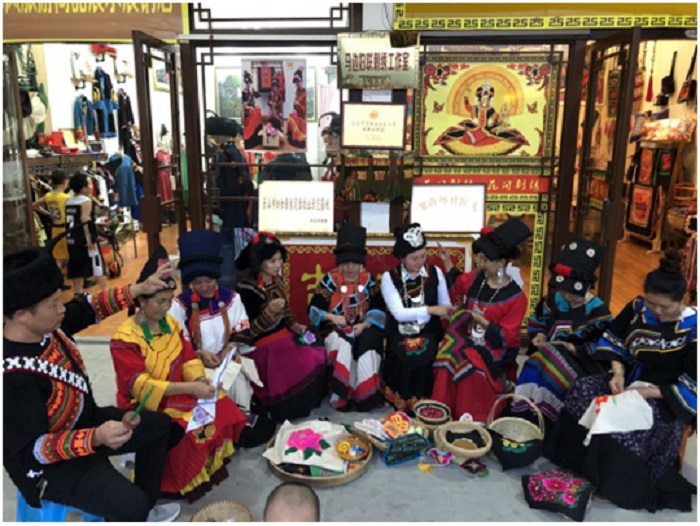



Embroidery skills have changed the life of impoverished women of Yi ethnic group in Yi autonomous county of Mabian, Southwest China’s Sichuan Province.
Qiaojin Shuangmei, a Yi embroiderer of a professional embroidery cooperative in Yi autonomous county of Mabian and a deputy to the 13th National People’s Congress (NPC), China’s top legislature, is always dressed in handmade costumes of Yi ethnic group made by her and other embroiderers of her cooperative on important occasions like the annual meetings of China’s top legislature and its top political advisory body.
Because of the influence of her mother, Qiaojin Shuangmei has been fond of embroidering since she was a child.
In 2015, she and four other embroiderers raised more than 20,000 yuan (about $2,956) and established a professional embroidery cooperative in Yi autonomous county of Mabian. Qiaojin Shuangmei then extended invitations to residents of poverty-stricken households in the county, hoping more poor people could learn embroidery skills at the cooperative.
In an effort to make embroidery play a bigger role in poverty alleviation, Qiaojin Shuangmei purchased a number of embroidery works of embroiderers from impoverished households.
She then told a white lie when she said to the embroiderers that she sold one of the scarves at a really good price of 1,000 yuan, while the truth was she didn’t sell the product for 1,000 yuan, not even 10 yuan.
“I wanted them to have confidence in the business. I wanted to help them change their life,” she explained.
“A scarf sold for 1,000 yuan” has now become a reality in Yi autonomous county of Mabian.
The local women’s federation has provided free training courses for embroiderers in Qiaojin Shuangmei’s embroidery cooperative, and financial institutions have rolled out loans with interest subsidies for the cooperative.
With the help of the local government, the cooperative has signed agreements with companies in Chengdu, capital of Sichuan Province, so that they can help sell the embroideries.
Today, the embroidered high-quality scarves made by embroiderers in the cooperative are sold for as much as over 1,000 yuan in Chengdu.
Meanwhile, the number of embroiderers in the cooperative has increased to nearly 300 from five, and some of them could even earn more than 10,000 yuan per month.
In November 2018, Leshan Electric Power Co., Ltd. under the State Grid, which provides partner assistance for Yi autonomous county of Mabian, held an embroidery contest in the locality.
During the final of the contest, more than 30 female embroiderers walked the runway in characteristic clothing of Yi ethnic group they made themselves, which made them more enthusiastic about making embroideries.
The company has also helped contact livestreaming platforms for the cooperative and provided the embroiderers with training in online marketing skills in a bid to promote embroideries through e-commerce platforms.
Industrial development, skill training and market-oriented assistance have inspired Qiaojin Shuangmei to better perform her duties as a deputy to the NPC.
She has constantly submitted proposals to the NPC and advocated introducing leading enterprises and cultivating foregoers in achieving prosperity for poverty alleviation relocation projects, so as to ensure the relocated residents live and work in peace and contentment.
The State Grid, as a partner assistance provider for the cooperative, has not only helped the latter with processing of embroideries, exhibition and the sale of products, as well as promoting business in brick-and-mortar stores, but helped sell embroidery products to faraway cities like Beijing, Hong Kong and Shenzhen via e-commerce platforms, according to Qiaojin Shuangmei.
As a female deputy to the NPC, Qiaojin Shuangmei has a profound understanding of the status and role of women in poverty alleviation.
“Women hold up half the sky. Women of ethnic minorities have shown great potential in the cause of poverty eradication,” she said.
During the prevention and control of the COVID-19 pandemic, Qiaojin Shuangmei initiated an activity with the help of local media outlets to provide online embroidery courses and encourage local embroiderers to make embroideries at home. She also promised to purchase their works.
So far, more than 1,000 local embroiderers in the county have been able to take care of their children while supporting their family by making embroideries.
More policies should be rolled out to support women of ethnic minorities in starting their own businesses and securing jobs, Qiaojin Shuangmei suggested in her proposals to the NPC.


The Executive and members of the.


The Acting Director, FCT Directorate of.


President Bola Ahmed Tinubu has been.



Barely a month after resignation of.


An Abuja based Legal Practitioner, Osuagwu.



Convener of Equitable Remedy, Mrs. Magaret.


Contractors handling the contract for city.


Nigerian government may have concluded plans.


The Diplomatic Correspondents Association of Nigeria.


A rights group, “Follow Me Talk.
Leave a Comment